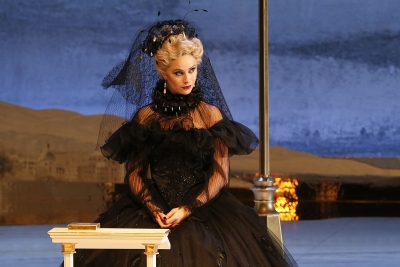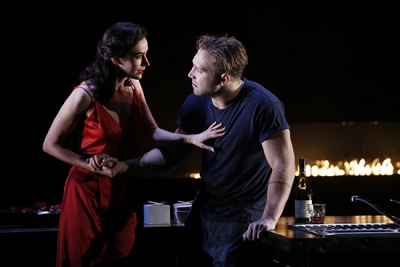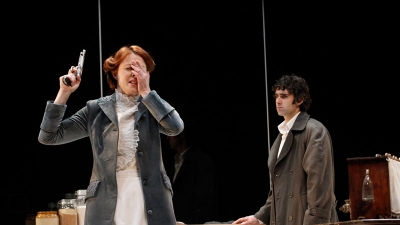Melbourne Theatre Company
Twelfth Night was probably composed in 1601, and certainly no later than 1602. Hamlet has a more doubtful provenance, possibly written before 1601 but also certainly no later than 1602. It is not inconceivable that Shakespeare worked on them simultaneously, or back to back ...
... (read more)This is Macbeth reimagined as a supernatural-themed action movie for the stage, a high-speed entertainment with explosions and gunplay and plenty of special effects. Macbeth and his fellow Scots scamper about in fatigues, flak jackets, and modern full-dress uniforms, accompanied ...
... (read more)Strindberg. How do you solve a problem like August? In his own time he was considered extreme. When Strindberg (1849–1912) gave Miss Julie to his publisher, Joseph Seligmann, in 1888, Seligmann insisted it be cut to make it more palatable for the Swedish public. The play wasn't published ...
... (read more)To highlight Australian Book Review's arts coverage and to celebrate some of the year's memorable concerts, operas, films, ballets, plays, and exhibitions, we invited a group of critics and arts professionals to nominate their favourites – and to nominate one production they are looking forward to in 2016. (We indicate which works were reviewed in Arts Up ...
The gestation of Harold Pinter’s fearsome, hilarious plays was often as interesting as his celebrated dramatic pauses. Betrayal, from 1978, is a good example. Though Pinter was then engaged in an affair with Lady Antonia Fraser that would end his marriage to Vivien Merchant – Pinter’s muse and the creator of many of his ...
In Saul Bass’s title sequence for Alfred Hitchcock’s 1959 film North by Northwest, diagonal and vertical lines intersect to form a grid that eventually dissolves to the façade of a New York City office building. Bringing the classic spy caper to the stage for the first time, Melbourne Theatre Company uses that visu ...
I first saw Summer of the Seventeenth Doll in 1957 in London, of all places. I remember feeling some pride in seeing the symbolic kewpie doll presiding over the New Theatre in the heart of the West End. June Jago’s performance as Olive has stayed with me over the years; Philip Hope-Wallace, the Guardian reviewer, described her as ‘all chin and elbows, but as genuine a dramatic actress as you could find’, which suggested an element of surprise that she should be ‘found’ in Australia. Jago had been in the original 1955 Union Rep production and placed her stamp on Olive: she was to be a hard act to follow. When The Doll came to London, it had already won itself a unique place in Australian drama, but there had been some concern about how the Brits would receive a play about rough canecutters and free-and-easy barmaids. But critics like Hope-Wallace – and the influential Kenneth Tynan – hailed ‘this harsh, cawing, strongly felt play’. The imperial imprimatur sealed the success of The Doll. Its later failure on Broadway could be dismissed as a judgement on American audiences rather than on the play.
... (read more)


